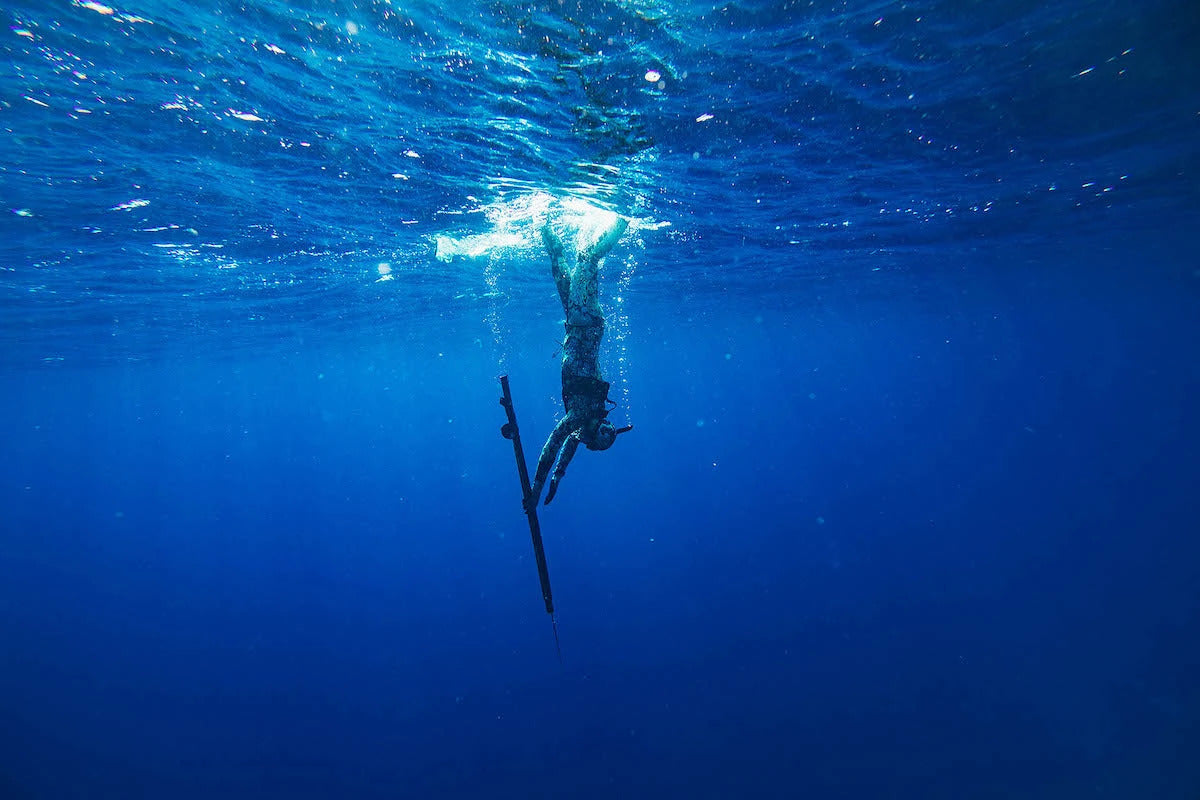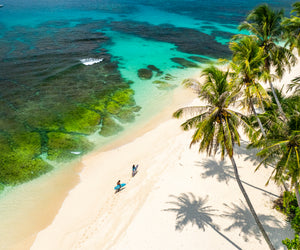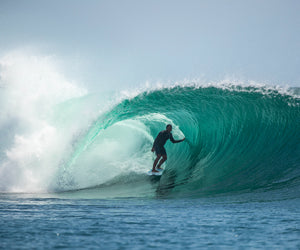
The Drifter Journals
Solomon Tales | Shadow & Light
Interview by Thomas Alexander
The Solomon Islands fall far from the radar of most travellers, a struggle of three or four planes and a boat or two just to reach your destination and little tourism infrastructure more than enough to dissuade the average digital nomad.
But herein lies the charm, the lure and the absolute uniqueness of the islands.

What many would call paradise, we were lucky enough to call 'home'. The island of Gatokae is all but untouched by Western influence, Driftwood Eco-Lodge providing off-grid, sustainable and ecologically-sensitive accommodation to its fortunate guests
Invited to explore the region by the new off-grid eco lodge Driftwood, owned by some close friends, we flew to Australia just to return to our neighbouring island - the only way to reach the Solomons from Bali.
What we found was a culture still holding onto its firm roots, an environment straight out of the Jurassic and some of the most spectacular reefs for diving that we have ever experienced. Wildlife is rife around the Solomon Islands, with so many vibrant reef and large deepwater fish, and plenty of apex predators to harvest them. Sharks are not of concern, with dangerous species rarely seen in Solomon waters, though some of the outer islands play home to saltwater crocodiles. But with the right guide, such as our locally-knowledgeable host Woody, interactions remain infrequent.

Gargantuan whale jaw bones, found washed up on the shoreline, provide an impressive gateway to Driftwood Eco-Lodge. Whales - predominantly pilot, sperm and humpback species - are often sighted in Solomon waters, but occasionally, in the right season and with a lot of luck, you can witness the largest creature ever to exist - the blue whale - majestically gliding through this pristine region.
“The visibility is incredible,” enthuses Curtis, Drifter Marketing Director and Crocodile Dundee reincarnated. “You can see up to 40 metres - it’s so clear, you can see easier underwater than above the water at times.”

With such clear water and superb visibility, the Solomons offer the avid spearfisher the perfect environment. Spearfishing is a primary means of produce gathering, offering a sustainable means of nutrition, without the detrimental impact of more conventional and commercial ways of fishing. Our Driftwood guide is actively educating locals on the benefits of spearfishing, for food, but also for sustainability and eoctourism.
The islands are boundless in adventuring opportunities, underwater swim-through caves transporting you into land-locked lagoons, several outer-reef surf breaks only accessible by boat, and a landscape steeped in a history of tribal warfare and headhunting. Yet while Driftwood provides exceptional hospitality, the location’s remoteness should always be respected.
During our journey, one of our party sliced his leg on a coral outcrop. The deep wound required suturing and more medical attention than could be provided locally. His evacuation was simple to arrange, if arduous for our limping compatriot, but as luck would have it, less than an hour into his trip he happened to meet some members of Médecins Sans Frontières, fortuitously on the island at the same time, to treat the communities.
Stitched and saved, he returned to us and could still enjoy the remainder of his Solomon experience. This remoteness has it’s blessings too. Little, if any, mobile signal forces you to disconnect, relinquishing your devices to your luggage, not to be touched until the return journey. Perhaps confronting at first, you rapidly become grateful for this involuntary digital detox, which allows you to immerse far deeper, both figuratively and literally in the deep blue ocean.

With no wifi or digital entertainment, you are forced to simply be here, now, appreciating every aspect of this exquisite corner of the world. In the hands of our guide and host, Woody, we ventured beyond Gatokae Island to take in the surrounding reefs and islands, each offering their own unique personalities and experiences.
“I wasn’t able to use my cell phone for anything other than taking photos,” recalls Curtis. “Digital detox is real! I felt so much better at the end of that and was sleeping so much better having not been subjected to digital signals for two straight weeks.”
The warm and friendly people are happy to share their islands and ways with visitors, venturing to old ruins and sites of interest, and talking tales of the wars and headhunting that was still in practice until the arrival of missionaries only 100 years ago. Now the islands are predominantly Christian, and harmony is prevalent in every aspect of Solomonese daily life.

The warm and friendly locals are more than happy to share their wisdom of the indigenous culture, flora and fauna, providing the delicious meals served at Driftwood Eco-Lodge, and educating visitors on what is edible and medicinal, and what is best avoided.
But there is a darker side to the Solomons. Logging and industrial fishing are taking their toll and the Solomons are facing a similar fate to other areas of Indonesia and the Melanesia.
“It was pretty disturbing seeing some of the logging happening on parts of the island,” shares Curtis. “We only saw it in some areas of certain islands, but you can see where they’ve clear-cut massive sections of hillside and the topsoil gets washed away into the ocean, where it covers the reef and then the reef dies too.

Despite the activities of commercial fishing, the Solomons are still abundant in marine life - a self-sustaining ecosystem from the tiniest reef fish to the top of the food chain. Sharks are plentiful, but most pose little threat to humans. We witnessed many sharks on our numerous dives, but they paid little attention to us as a form of prey or threat. However, they have become accustomed to the sound of a speargun bolt and frequently flock to a dive site in hope of a free lunch!
“Commercial fishing is also relentless. These floating processing stations send out smaller boats to reach these remote areas. Added to that, foreigners come in and give the locals dynamite. They return a few days later and buy up everything for next to nothing after destroying centuries of reef. While most of what we saw was spectacular, there were also patches which, very evidently, had been dynamited.
“But that’s the problem with capitalism. It’s driven by other nations, not the Solomonese, so if they give enough money to the right person, they can get away with anything.”
The silver lining is that - with a diminutive population and close-knit community - the realisation of a need for sustainability is growing rapidly.
“Anyone who has seen an area that has been dynamited soon realises how much fish you lose and how long it takes to replenish, and the locals aren’t into it.”
Woody, the manager of Driftwood, is incredibly proactive, harvesting almost all produce on site and from the ocean, cooked by locals in traditional ways, such as hangi-style underground ovens, and supporting local communities to help them achieve grants to monopolise on sustainable eco-tourism. He also educates them on how best to fish to support the islands’ oceanic ecosystem.

While logging does occur in the Solomons, it is fortunately localised and minimal, allowing the natural jungles, rainforests and mangroves to flourish. The Solomonese have always been highly aware of their interdependence with their surroundings, meaning the landscapes are little different now to what they were thousands of years ago.
“People like Woody are taking the stand. They know they can make more money off of preservation and ecotourism and diving and fishing, then they can from commercial fishing or logging, which only comes one time.”
A Third World country, the Solomon Islands are still at the mercy of what we deem more advanced nations; the United States, China, Australia. But a nation that hasn’t learned how to live sustainably, or worse, has learned and chooses to ignore it, surely can’t be that advanced.
However, with our support, micro-nations such as the Solomons can be preserved. By refusing palm oil, investigating the source of your seafood, or better, catching it for yourself, and by visiting the places to encourage ecotourism and support, both physically and financially, we have the power to change the way these inspirational cultures sustain not only themselves, but also their island paradises for generations to come.

Legend: Mono has returned to Noosa for many years, more recently as an honorary legend for the Noosa Festival of Surfing, alongside the likes of Tom Carroll, Taylor Jensen, Layne Beachley, Bob McTavish and Mark Cunningham
Driftwood Eco Lodge is situated in a picturesque virgin forest wilderness surrounded by pristine ocean in the Solomon Islands. It is located in the South Pacific Ocean, lying south of Papua New Guinea and N.E of Australia’s Great Barrier Reef. You can fly there in just 3 hours from Australia or Fiji.
It offers a unique eco-adventure holiday in one of the last civilisations in the world who live a subsistence lifestyle. Soak up nature and go on purposeful hunting and gathering adventures both in the ocean and on land, together with Driftwood's friends and teachers - the village people of the Morovo Lagoon.
For more information, go to: www.driftwoodsi.com
All Photos: Tommy Schultz - www.tommyschultz.com | @tommyschultz
The Drifter team flew Solomon Airlines & stayed at Driftwood Off-the Grid Eco-Lodge




